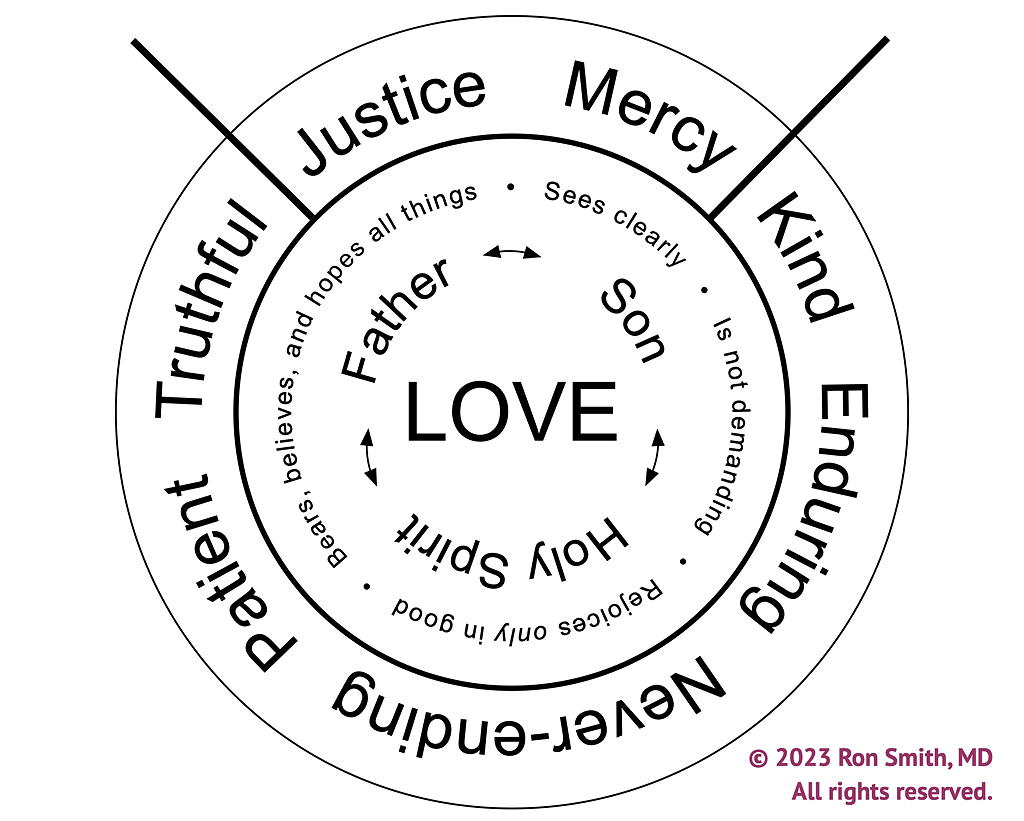Podcast 1. The Circle of Love
Series. The Context of God
Audio In Production

1John 4:8 (ESVS) Anyone who does not love does not know God, because God is love.
Welcome to the first Decisive Love Podcast. Before I take you much deeper, you must understand the Circle of Love diagram which you will find it at www.psalm8510.com/podcasts/.
As I describe each layer from the center out, you’ll need to have this in view. We will being at the center with agape love. Unlike the other five loves, agape is unconditional covenant love. C. S. Lewis described four loves, but there are indeed six.
In the Old Testament, God calls himself “I AM.” In the 1 John 4:8, his character of love is who he is which is why it is in the center. Because this is central to who God is, He will always love you even if you reject and walk away. Numbers 23:19 declares that he is not a son of man who’s mind changes.
What he was before our creation remains unchanged. He is the same yesterday, today, and forever, and he exists in timelessness. But the trinity of God originates from the plural Hebrew word elohiym ( MyIhølTa elohiym).
The next layer out from love shows the loving relationship between the Father, the Son, and the Holy Spirit. Before he created time and space, the three persons of God were each giving and receiving agape love from the other which is what the arrows between them indicate. This is the primary context of God.
The term for this giving and receiving is perichoresis and is derived from the Greek word perichoresi maning “rotation.” The Greek itself comes from peri which means “around” and chorien which means “to give away.” Imagine when the mixer beaters pull the contents from the top down to the bowl bottom. From there, the contents gets pushed up along the bowl walls. The whole process repeats after the contents reach the top and are again pulled down to the bottom
Perichoresis cannot be found at dictionary.com or probably any other similar online resource. I did find it in my 1941 copy of Webster’s Second Edition of the New International Dictionary of the English Language. There perichories equates to circumcision. When I searched my Accordance Bible app for “circumcise heart,” I found these scriptures.
Deut. 10:16 (ESVS) Circumcise therefore the foreskin of your heart, and be no longer stubborn.
Deut. 30:6 (ESVS) And the LORD your God will circumcise your heart and the heart of your offspring, so that you will love the LORD your God with all your heart and with all your soul, that you may live.
Jer. 4:4 (ESVS) Circumcise yourselves to the LORD;
remove the foreskin of your hearts,
O men of Judah and inhabitants of Jerusalem;
lest my wrath go forth like fire,
and burn with none to quench it,
because of the evil of your deeds.”
In my diagram, Agape flows continuously between God’s three persons. All who dwell with God give and receive love in the same way. This imagery describes why we should remember that heaven is where God is. Our Lord beckons us to circumcise our hearts and join him in that perichoretic agape flow.
Now focus on the outer text circle. Can you see how God’s truthfulness is derived from his agape love? TItus 1:2 confirms that God never lies while Satan is the father of lies. John 8:44 confirms that, and it also declares that Satan’s lies come from his central nature of hate.
John 8:44 (ESVS) You are of your father the devil, and your will is to do your father’s desires. He was a murderer from the beginning, and does not stand in the truth, because there is no truth in him. When he lies, he speaks out of his own character, for he is a liar and the father of lies.
Kindness arises from his agape love toward us who have responded to his call to join his perichoresis. You need only consider the parable of the prodigal son who abandoned his father’s protection for the harshness of the life in which he found himself. His father was nothing but kind when his son returned. Harshness may be required to get our attention, but God’s heart is always kind towards us.
Rom. 11:22 (ESVS) Note then the kindness and the severity of God: severity toward those who have fallen, but God’s kindness to you, provided you continue in his kindness. Otherwise you too will be cut off.
His endurance clearly proceeds from his agape love. Hebrews tells how love drove Jesus’s endurance of the crucifixion because he saw the joy beyond the pain.
Heb. 12:1 (ESVS) Therefore, since we are surrounded by so great a cloud of witnesses, let us also lay aside every weight, and sin which clings so closely, and let us run with endurance the race that is set before us, 2 looking to Jesus, the founder and perfecter of our faith, who for the joy that was set before him endured the cross, despising the shame, and is seated at the right hand of the throne of God.
Phil. 2:1 (ESVS) So if there is any encouragement in Christ, any comfort from love, any participation in the Spirit, any affection and sympathy, 2 complete my joy by being of the same mind, having the same love, being in full accord and of one mind.
Patience is clearly born out of agape love.
Eph. 4:1 (ESVS) I therefore, a prisoner for the Lord, urge you to walk in a manner worthy of the calling to which you have been called, 2 with all humility and gentleness, with patience, bearing with one another in love, 3 eager to maintain the unity of the Spirit in the bond of peace.
Finally, the sweetness of his never-ending aspect remains in my heart the most powerful derivative of his love. There is nothing I can do to change that.
Lam. 3:22 (ESVS) The steadfast love of the LORD never ceases; his mercies never come to an end;
1Cor. 13:8 (ESVS) Love never ends. As for prophecies, they will pass away; as for tongues, they will cease; as for knowledge, it will pass away.
What about justice and mercy? The key to this comes from understanding Psalm 85:10. My favorite translation of this verse comes from the Amplified Bible. The Hebrew for righteousness there also means justice. Mercy comes from the Hebrew chesed translated as steadfast love which is the Old Testament equivalent of agape in the New Testament.
Psa. 85:10 (AMP) Mercy and loving-kindness and truth have met together; righteousness and peace have kissed each other.
God loves justice for those who are wronged, and mercy for those who ask for it.
Is. 61:8 (ESVS) For I the LORD love justice; I hate robbery and wrong;
Psa. 51:1 (ESVS) Have mercy on me, O God, according to your steadfast love; according to your abundant mercy blot out my transgressions.
Only through Jesus who stands between justice and mercy can anyone pass to become part of his perichoretic steadfast agape love. I’ll leave this unambiguous verse about God’s central character.
1Cor. 13:13 (ESVS) So now faith, hope, and love abide, these three; but the greatest of these is love.
Questions & Answers. Send questions to postmaster@psalm8510.com.
- What does “Context of God” really mean, and why is this important? Consider what existed prior to creation. God alone in his three persons and his primary and derivative characters as shown in the Circle of Love. In order for me to fully understand holiness, I had to understand what holiness is. I will explore this is an upcoming podcast in this series.
